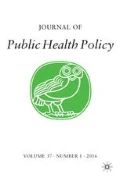Abstract
In sub-Saharan Africa previous health gains have been reversed and many countries are not on track to achieving the Millennium Development Goals. The reasons are multifaceted but relate fundamentally to poorly functioning health systems and the HIV, AIDS, and tuberculosis epidemics. Although population health can be improved through specific health interventions that target high burden diseases, these interventions must be offered within a functional health system for optimal effectiveness. Schools of Public Health in Africa should respond to the many systemic issues that confound improvements in population level health through reviewing approaches to health professional training that incorporates a public health approach, focusing on health systems research; collaboration, advocacy and networking; and strengthening health systems management. Institutional mechanisms to define joint research agendas and two-way exchanges between universities and national health systems are required.
References
World Health Organization. (2006) The African Regional Health Report: The Health of the People. Geneva: WHO.
Chopra, M. et al (2009) Achieving the health Millennium Development Goals for South Africa: Challenges and priorities. Lancet 374 (9694): 1023–1031.
World Health Organization. (2003) The World Health Report 2003 – Shaping the Future. Geneva: WHO.
World Health Organization. (2004) The World Health Report 2004 – Changing History. Geneva: WHO.
World Health Organization. (2005) The World Health Report 2005 – Make Every Mother and Child Count. Geneva: WHO.
Blaauw, D. and Penn-Kekana, L. (2010) Maternal health. In: S. Fonn and A. Padarath (eds.) South African Health Review 2010. Durban, South Africa: Health Systems Trust.
McKerrow, N. and Mulaudzi, M. (2010) Child mortality in South Africa, using existing data. In: S. Fonn and A. Padarath (eds.) South African Health Review 2010. Durban, South Africa: Health Systems Trust.
Nunn, P., Harries, A., Godfrey-Fausset, P., Gupta, R., Maher, D. and Raviglione, M. (2002) The research agenda for improving health policy, systems performance and service delivery for tuberculosis control: A WHO perspective. Bulletin of the World Health Organization 80: 471–476.
Maine, D. and Rosenfield, A. (1999) The safe motherhood initiative: Why has it stalled? American Journal of Public Health 89 (4): 480–482.
Lush, L., Cleland, J., Walt, G. and Mayhew, S. (1999) Integrating reproductive health: Myth and ideology. Bulletin of the World Health Organization 77: 771–777.
Bryce, L. et al (2003) Reducing child mortality: Can public health deliver? Lancet 362: 159–164.
Walsh, J.A. and Warren, K.S. (1979) Selective primary health care: An interim strategy for disease control in developing countries. New England Journal of Medicine 301: 967–974.
Bill and Melinda Gates Foundation and McKinsey & Company. (2005) Global Health Partnerships: Assessing Country Consequences. McKinsey & Company.
World Health Organization Maximising Positive Synergies Collaborative Group. (2009) An assessment of interactions between global health initiatives and country health systems. Lancet 373 (9681): 2137–2169.
Schneider, H., Blaauw, D., Gilson, L., Chabikuli, N. and Goudge, J. (2006) Health systems and access to antiretroviral drugs for HIV in Southern Africa: Service delivery and human resources challenges. Reproductive Health Matters 14 (27): 12–23.
Schneider, H., Barron, P. and Fonn, S. (2007) The promise and the practice of transformation in South Africa's health system. In: S. Buhlungu, J. Daniel, R. Southall and J. Lutchman (eds.) State of the Nation South Africa 2007. Cape Town, South Africa: Human Sciences Research Council Press, pp. 289–311.
Rispel, L.C. and Moorman, J. (2010) Analysing health legislation and policy in South Africa: Context, process and progress. In: S. Fonn and A. Padarath (eds.) South African Health Review 2010. Durban, South Africa: Health Systems Trust.
El Ansari, W., Russell, J., Ryder, E. and Chambers, C. (2003) New skills for a new age: Leading the introduction of public health concepts in healthcare curricula. Public Health 117: 77–87.
Frenk, J. et al (2010) Health professionals for a new century: Transforming education to strengthen health systems in an interdependent world. Lancet 376 (9756): 1923–1958.
IJsselmuiden, C.B., Nchinda, T.C., Duale, S., Tumwesigye, N.M. and Serwadda, D. (2007) Mapping Africa's advanced public health education capacity: The AfriHealth project. Bulletin of the World Health Organization 85 (12): 914–922.
World Bank. (1995) Retaining teaching capacity in Africa Universities: Problems and Prospects. Findings; Africa Region No 39. IBRD, Washington, DC.
Crawford, M., Watson, R. and Farley, S. (2003) Strategic approaches to science and technology in development. The World Bank Policy Research Working Paper Series 3026.
Fonn, S. (2005) African PhD research capacity in public health raison d’être and how to build it. In: S. Matlin (ed.) Global Forum Update on Research for Health. London: Pro-Brook Publishers, pp. 80–83.
Ezeh, A.C. et al (2010) Building capacity for public and population health research in Africa: The consortium for advanced research training in Africa (CARTA) model. Global Health Action 3 (5693), doi:10.3402/gha.v3i0.5693.
Fonn, S. and Tint, K.S. (2002) Transforming reproductive health services in South Africa: Women's health advocates and government in partnership. In: N. Haberland and D. Measham (eds.) Responding to Cairo: Case Studies of Changing Practice in Reproductive Health and Family Planning. New York: Population Council, pp. 74–96.
Evans, T., Nishtar, S., Atun, R. and Etienne, C. (2008) Scaling up research and learning for health systems: Time to act. Lancet 372 (9649): 1529–1531.
Butler, A. (2007) The state of the African National Congress. In: S. Buhlungu, J. Daniel, R. Southall and J. Lutchman (eds.) State of the Nation South Africa 2007. Cape Town, South Africa: HSRC Press, pp. 35–52.
Author information
Authors and Affiliations
Additional information
The author argues that Schools of Public Health in Africa should respond to the many systemic issues that confound improvements in population health, and proposes specific strategies for such a response.
Rights and permissions
About this article
Cite this article
Fonn, S. Linking public health training and health systems development in sub-Saharan Africa: Opportunities for improvement and collaboration. J Public Health Pol 32 (Suppl 1), S44–S51 (2011). https://doi.org/10.1057/jphp.2011.37
Published:
Issue Date:
DOI: https://doi.org/10.1057/jphp.2011.37

